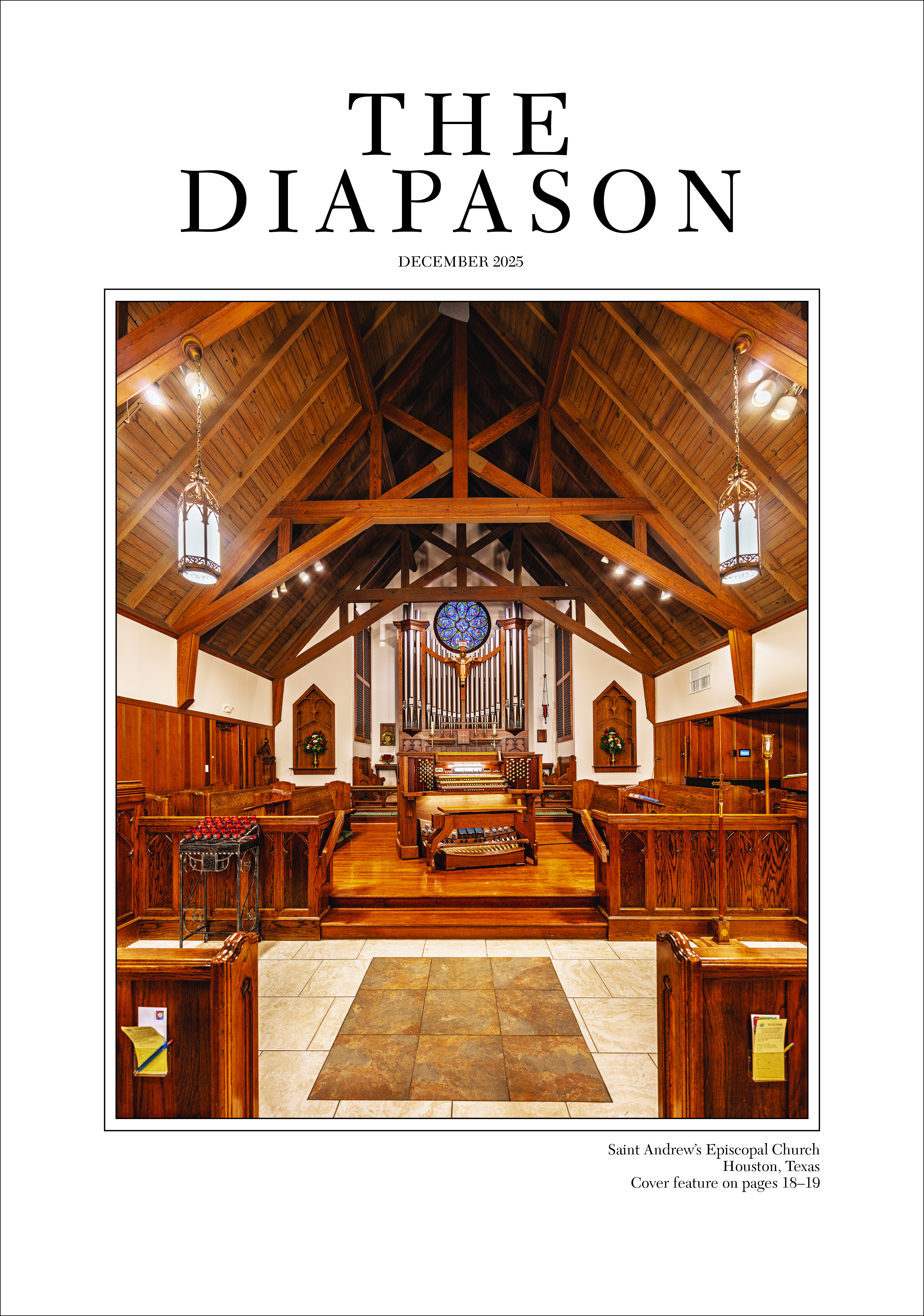
August 20, 1914, was the birth date of organist/composer Wilbur C. Held. The place was the Chicago suburb of Des Plaines, an address familiar, no doubt, to some readers of The Diapason! Earlier this year, as I began to think of possible repertory for my annual guest recital on the elegant C. B. Fisk organ of First Presbyterian Church in Santa Fe, New Mexico, I was drawn to Dr. Held’s variations on Veni Creator Spiritus (Come Holy Spirit), published in the Concordia volume Hymn Preludes for the Pentecost Season (1979); years ago, I had penciled in the composer’s date of birth in my copy. At a later point in the program’s gestation period it struck me that arriving at a composer’s centennial year while that person is still a lively presence among us is quite a rarity: perhaps one that should be noted, and celebrated!
Although there was always music in Wilbur’s home (his mother was an accomplished violinist) his own dedication to a musical future did not occur until his collegiate years at the American Conservatory of Music in Chicago, where he studied organ with Frank van Dusen, took theory classes with John Palmer, and for seven years was Leo Sowerby’s assistant at St. James Episcopal Cathedral.
With both bachelor and master’s degrees from the conservatory and his invaluable experience with Sowerby, Held was hired to join the music faculty at Ohio State University in Columbus in 1946, where he ultimately became professor of organ and church music and head of the keyboard division. Additionally he served as organist-choirmaster of Trinity Episcopal Church in Ohio’s capital city. During these years he went on to earn his doctorate in sacred music from Union Theological Seminary in New York, where he studied organ with Vernon de Tar and composition with Normand Lockwood and Wallingford Rieger. There were also master lessons with Marcel Dupré and André Marchal during their various recital tours in the United States.
Dr. Held retired from his Ohio positions and moved to California in 1978, where he has continued his musical activities as composer, clinician, and organist.
My small tribute to Wilbur Held is not a unique happening: on May 4, Maxine Brechbiel, a friend and former student of Dr. Held, mounted a program of his compositions at her church, Trinity United Methodist in Pomona, California. She accompanied the Five Psalm Settings for soprano and organ, and invited Paul Hesselink of Las Vegas, Nevada, to perform a varied selection of solo organ works. Selecting pieces from each of seven decades, Paul showcased the variety and skill, as well as the “impeccable good taste” that he commented is “always to be found in a composition that bears the Held signature.” This celebratory program ended with Wilbur’s recorded performance of the Liszt Prelude and Fugue on BACH.
In a gracious letter to this writer (whom he graced with the title “Mr. Harpsichord”), Wilbur, an acquaintance from my Oberlin student days, wrote of the reason that a recording was substituted for his own live performance of the Liszt. Dated June 3, 2014, his letter explains:
I’m grateful to be in good health although my hearing has deteriorated very much in the last couple of years—not just softening in volume, but distorting everything—when I play the organ I hear different notes than the ones I’m playing. . . I have limited my playing to an occasional vesper service here at the [Claremont] Manor. After all, I know what notes I’m playing; I just ignore what I hear!
In a spoken introduction to the organ works he selected for the May 4 concert (see sidebar), Dr. Hesselink noted the difficulty of choosing 40 minutes of music from the more than 350 possibilities composed by Wilbur Held, and, in a particularly interesting paragraph, described a fortuitous event that resulted in the wider dissemination of one work:
Not only is the setting of Divinum Mysterium [Of the Father’s Love Begotten] beautiful in its own right, but I can claim some credit for its larger distribution. I was playing a recital at Third Reformed Church in Holland, Michigan and had programmed several short Held pieces. Dr. Roger Davis was at the church to work on a few minor repairs to their wonderful [Robert] Sipe tracker organ and in seeing the program he said, ‘It would be wonderful to have a Wilbur Held composition for my new organ method book. I like his things so much, but I don’t know him at all.’ I replied, ‘Well, I think I can fix that.’ The upshot was that Wilbur allowed the reprinting of this chant setting for inclusion in Davis’s The Organists’ Manual, an organ teaching method first published in 1985 [W. W. Norton] which has become one of the mainstays in the organ teaching world and has sold thousands of copies. So along the line, many developing organists have had the pleasure of learning and performing this beautiful setting.
On the very morning that I sat down to compose this commemorative piece, the first e-mail to be opened was one from the Organ Historical Society’s OnLine Store, in which the second item listed was a new issue from MorningStar Music entitled New Every Morning: Six Settings of Morning Hymns for Organ—simple and well-crafted arrangements composed by Wilbur Held.
It is remarkable to arrive at the age of 100. It is even more remarkable if one still continues to be a productive contributor to the musical needs of one’s professional colleagues. Happy birthday Wilbur Held, and we wish you continued joy and musical fulfillment.
Thanks to Paul Hesselink for his major contributions of text and pictures, and to Maxine Brechbiel for relaying my initial e-mail to Wilbur Held.

